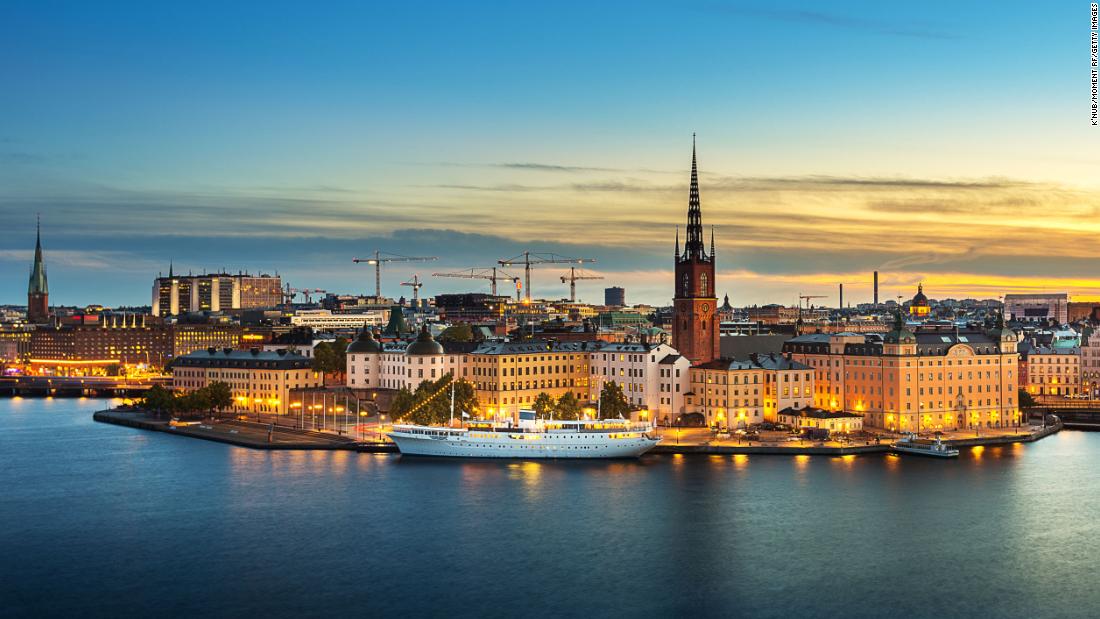(CNN) — The US Centers for Disease Control and Prevention on Tuesday updated its travel advisory page for Covid-19. Just two new places, both in Africa, joined the crowded “high” risk category.
But perhaps more notable this week is the news that two destinations in stubbornly high Europe were downgraded to “moderate” risk.
The Scandinavian cultural powerhouse of Sweden and heavily forested and historic Romania in Eastern Europe provide two bright spots on a continent that has been mired in the “high” risk category.
The Level 3 “high” risk category is now the top rung in terms of risk level. Level 2 is considered “moderate” risk. Level 1 is “low” risk.
Level 4, previously the highest risk category, is now reserved only for special circumstances, such as extremely high case counts, emergence of a new variant of concern or health care infrastructure collapse. Under the new system, no destinations have been placed at Level 4 so far.

A herd of elephants is spotted in eastern Botswana. The southern African nation is now at Level 3.
Cameron Spencer/Getty Images
The “Level 3: Covid-19 High” category now applies to places that have had more than 100 cases per 100,000 residents in the past 28 days. The two destinations joining Level 3 this week are:
• Botswana
• Cape Verde
Botswana, a landlocked safari favorite, moved all the way up from Level 1 while Cape Verde, off the west coast of Africa in the North Atlantic, moved up from Level 2.
There were more than 110 destinations at Level 3 on June 21. Level 3 locations account for almost half of the roughly 235 places monitored by the CDC.
More on Level 3

The Eiffel Tower basks in a romantic Paris twilight. France is still at the CDC’s Level 3.
Martin Bureau/AFP via Getty Images
Despite the good news on Sweden and Romania, much of Europe has been stubbornly lodged there for months with the summer travel season started. As of June 21, the following popular European destinations were among those remaining at Level 3:
• France
• Germany
• Greece
• Ireland
• Italy
• The Netherlands
• Norway
• Spain
• United Kingdom
But it’s not just European favorites that find themselves at Level 3. Numerous notable travel destinations around the world are among those in the ‘high’ risk category, including the following:
• Brazil
• Canada
• Costa Rica
• Malaysia
• Mexico
• South Korea
• Thailand
Level 2

Biertan is one of the most important Saxon villages with fortified churches in Transylvania, Romania. The Eastern European nation is now at Level 2.
Andrea Ricordi/Moment RF/Getty Images
Destinations carrying the “Level 2: Covid-19 Moderate” designation reported 50 to 100 Covid-19 cases per 100,000 residents in the past 28 days. Six places in total were moved to this level on Tuesday:
• Bolivia
• Ethiopia
• Kenya
• Morocco
• Romania
• Sweden
Unlike the two European nations, the move into Level 2 was actually not good news for Bolivia, Kenya and Morocco, which had been at Level 1. (Ethiopia did not appear on last week’s roundup).
Level 1
To be in “Level 1: Covid-19 Low,” a destination must have had 49 or fewer new cases per 100,000 residents over the past 28 days. Six destinations scattered all around the world were added to the category on June 21:
• El Salvador
• Fiji
• Guinea
• Moldova
• Sint Eustatius
• Tanzania
The move was particularly good news for the Caribbean’s tiny Dutch island of Sint Eustatius, which had been at Level 3.
Last week, El Salvador, Fiji and Moldova had been at Level 2 while Africa’s Guinea and Tanzania were “unknown.”
Unknown
Finally, there are the destinations the CDC has deemed to be of “unknown” risk because of a lack of information. Usually, but not always, these are small, remote places or places with ongoing warfare or unrest. This week, four places were added to this category:
• Bhutan
• Comoros
• Democratic Republic of the Congo
• Ghana
The CDC advises against travel to these places precisely because the risks are unknown. Other destinations in this category include Cambodia, the Canary Islands and Macau.
A medical expert weighs in on risk levels
Transmission rates are just “one guidepost” for travelers’ personal risk calculations, according to CNN Medical Analyst Dr. Leana Wen.
We’ve moved into “a phase in the pandemic where people need to make their own decisions based on their medical circumstances as well as their risk tolerance when it comes to contracting Covid-19,” said Wen, who is an emergency physician and professor of health policy and management at the George Washington University Milken Institute School of Public Health.
There are other factors to weigh in addition to transmission rates, according to Wen.
“Another is what precautions are required and followed in the place that you’re going and then the third is what are you planning to do once you’re there,” she said.
“Are you planning to visit a lot of attractions and go to indoor bars? That’s very different from you’re going somewhere where you’re planning to lie on the beach all day and not interact with anyone else. That’s very different. Those are very different levels of risk.”
Vaccination is the most significant safety factor for travel, since unvaccinated travelers are more likely to become ill and transmit Covid-19 to others, Wen said.
And it’s also important to consider what you would do if you end up testing positive away from home.
Top image: Twilight over Riddarholmen Church in Stockholm, Sweden. (K’Nub/Moment RF/Getty Images)
